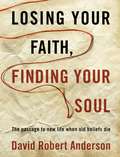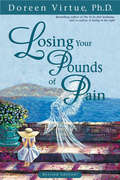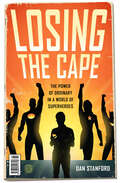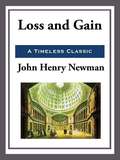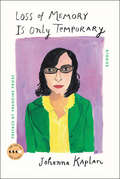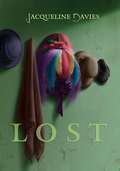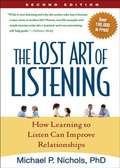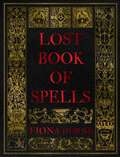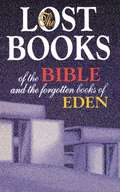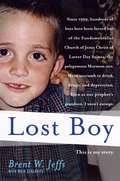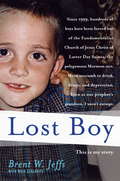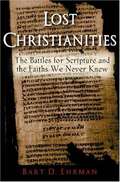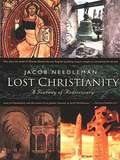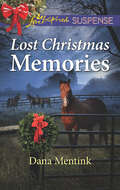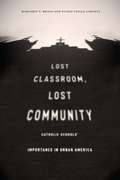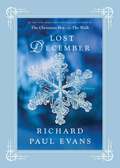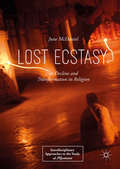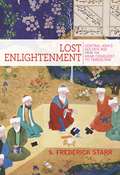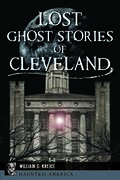- Table View
- List View
Losing Your Faith, Finding Your Soul: The Passage to New Life When Old Beliefs Die
by David Robert AndersonLosing Your Faith, Finding Your Soul is for those of us who have come to the end of traditional beliefs and wonder if we have reached the end of faith as well. It is for the day when assumptions about God and the religious teachings we trusted in the past no longer apply to life. When your old beliefs die, is it possible to hold onto faith? David Robert Anderson answers this question with a resounding yes. With Anderson as friend and guide, we discover that what once seemed an ending is actually a promising beginning--an invitation into a more authentic, and very different, spiritual experience.acher, Anderson helps readers identify and come to terms with the fear, grief, and confusion that accompany a shift in our spiritual foundation. Then, drawing deeply from the literature of the spirit and the experience of fellow seekers, he identifies six life-tested passages that lead us through the changes and toward authentic renewal. The outcome--as so many have already discovered--is a richer, more mature faith, and a fresh sense of being alive in God. "After all," writes Anderson, "becoming fully alive spiritually is not only the task of a lifetime; it is the challenge and gift of every moment."From the Hardcover edition.
Losing Your Pounds of Pain: Breaking The Link Between Abuse, Stress, And Overeating
by Doreen VirtueThis book shows how you can break the damaging connection between emotional pain and overeating to uncover your true, natural self by shedding the false skin of unhappiness.
Losing Your Religion, Finding Your Faith: Spirituality And Young Adults
by Brett C. HooverA guide to helping Gen-Xers reconnect with spirituality and faith in their lives today. Describes the lifelong process of discovering both God and self and explains that for the typical young adult, loss of faith is a necessary part of maturing spirituality.
Losing the Cape: The Power of Ordinary in a World of Superheroes
by Dan StanfordHow to be a hero when you&’re feeling anything but superDespite all the superhero hype, the problems and pain in our world aren&’t going away. In fact, it often feels like the threats just keep coming. But the good news is that God has placed you here for such a time as this. And the even better news? You don&’t have to get rid of your anxiety, debt, speech impediment, extra weight, health issues, disability—or any other weakness—to be used by God. What this world actually needs is less-than-super people making small but significant differences in their own corners of the world. Through inspiring stories from the Bible and his own life, Dan Stanford demonstrates that with God availability is more important than ability. Losing the Cape is an invitation to start making the world a better place through your ordinary, everyday presence.
Losing the Cape: The Power of Ordinary in a World of Superheroes
by Dan StanfordHow to be a hero when you&’re feeling anything but superDespite all the superhero hype, the problems and pain in our world aren&’t going away. In fact, it often feels like the threats just keep coming. But the good news is that God has placed you here for such a time as this. And the even better news? You don&’t have to get rid of your anxiety, debt, speech impediment, extra weight, health issues, disability—or any other weakness—to be used by God. What this world actually needs is less-than-super people making small but significant differences in their own corners of the world. Through inspiring stories from the Bible and his own life, Dan Stanford demonstrates that with God availability is more important than ability. Losing the Cape is an invitation to start making the world a better place through your ordinary, everyday presence.
Losing the Temple and Recovering the Future
by Hindy NajmanThis book explores the Jewish community's response to the destruction of the Second Temple in 70 CE. The focus of attention is 4 Ezra, a text that reboots the past by imaginatively recasting textual and interpretive traditions. Instead of rebuilding the Temple, as Ezra does in the books of Ezra and Nehemiah, the Ezra portrayed in 4 Ezra argues with an angel about the mystery of God's plan and re-gives Israel the Torah. Drawing on Walter Benjamin, the imaginative project of 4 Ezra is analyzed in terms of a constellation composed of elements from pre-destruction traditions. Ezra's struggle and his eventual recommitment to Torah are also understood as providing a model for emulation by ancient Jewish readers. 4 Ezra is thus what Stanley Cavell calls a perfectionist work. Its specific mission is to guide the formation of Jewish subjects capable of resuming covenantal life in the wake of a destruction that inflects but never erases revelation.
Loss and Gain
by John Henry NewmanThis novel about a young man's intellectual and spiritual development was the first work John Henry Newman wrote after entering the Roman Catholic Church in 1845. The story describes the perplexing questions and doubts Charles Reding experiences while attending Oxford. Though intending to avoid the religious controversies that are being heatedly debated at the university, Reding ends up leaving the Church of England and becoming a Catholic. A former Anglican clergyman who was later named a Catholic cardinal, Newman wrote this autobiographical novel to illustrate his own reasons for embracing Catholicism.
Loss of Memory Is Only Temporary (Art of the Story)
by Johanna KaplanA funny, fresh, and brilliantly insightful collection of stories from a beloved writer, with a new introduction by Francine ProseJohanna Kaplan’s beautifully written stories first burst on the literary scene in the late 1960s and early 1970s. Today they have retained all of their depth, surprise, and humor—their simultaneously scathing, hilarious, and compassionate insight into character and behavior. From Miriam, home from school with the measles, to Louise, the daughter of a family that fled Vienna for the Dominican Republic, to Naomi, a young psychiatrist, her heroines are fierce, tender, funny, and cuttingly smart.At once specific to a particular period, place, and milieu—mainly, Jewish New York in the decades after World War II—Kaplan’s stories resonate with universal significance. In this new collection, which includes both early and later stories, unforgettably vivid characters are captured in all of their forceful presence and singularity, their foolishness and their wisdom, their venality and their nobility, while, hovering in the background, the inexorable passage of time and the unending pull of memory render silent judgment.In its pitch-perfect command of dialogue matched with interwoven subtleties of insight and feeling and a masterful control of language, Loss of Memory Is Only Temporary is itself a timeless collection of the finest work by one of the most extraordinary talents of our age.
Lost
by Jacqueline DaviesIn 1911 New York, sixteen-year-old Essie Rosenfeld must stop taking care of her irrepressible six-year-old sister when she goes to work at the Triangle Waist Company, where she befriends a missing heiress who is in hiding from her family.
Lost Art of Listening, Second Edition
by Michael NicholsOne person talks; the other listens. It's so basic that we take it for granted. Unfortunately, most of us think of ourselves as better listeners than we actually are. Why do we so often fail to connect when speaking with family members, romantic partners, colleagues, or friends? How do emotional reactions get in the way of real communication? This thoughtful, witty, and empathic book has already helped over 100,000 readers break through conflicts and transform their personal and professional relationships. Experienced therapist Mike Nichols provides vivid examples, easy-to-learn techniques, and practical exercises for becoming a better listener--and making yourself heard and understood, even in difficult situations.
Lost Art of Listening, Second Edition
by Michael P. NicholsOne person talks; the other listens. It's so basic that we take it for granted. Unfortunately, most of us think of ourselves as better listeners than we actually are. Why do we so often fail to connect when speaking with family members, romantic partners, colleagues, or friends? How do emotional reactions get in the way of real communication? This thoughtful, witty, and empathic book has already helped over 100,000 readers break through conflicts and transform their personal and professional relationships. Experienced therapist Mike Nichols provides vivid examples, easy-to-learn techniques, and practical exercises for becoming a better listener--and making yourself heard and understood, even in difficult situations.
Lost Art of Listening, Second Edition
by Michael P. NicholsOne person talks; the other listens. It's so basic that we take it for granted. Unfortunately, most of us think of ourselves as better listeners than we actually are. Why do we so often fail to connect when speaking with family members, romantic partners, colleagues, or friends? How do emotional reactions get in the way of real communication? This thoughtful, witty, and empathic book has already helped over 100,000 readers break through conflicts and transform their personal and professional relationships. Experienced therapist Mike Nichols provides vivid examples, easy-to-learn techniques, and practical exercises for becoming a better listener--and making yourself heard and understood, even in difficult situations.
Lost Book of Spells
by Fiona HorneDiscover a grimoire of over 150 spells from leading witch Fiona HorneLost for many years, this collection draws together over 30 years of spells old and new created by Fiona Horne for everything from traditional topics such as love and relationships, self-care and wellbeing, and money and work, to up-to-the-minute issues such as social media challenges, environmental concerns and mental health in our busy modern world. Fiona Horne guides you through how to spellcast as well as different kinds of natural magick such as working with the energy of the moon and sun, and shares the secret of crafting a magickal life: stop asking for things just for you and start helping others instead. A treasure trove of magickal advice and know-how, this spell book will show you how to charm away a cold or flu, how to make your in-laws to like you, spells to find new love or add spice to your relationship, magick yourself into a new job and much more. Whether you're an experienced practitioner or just starting on your magickal life, this book is for you.
Lost Books of the Bible and the Forgotten Books of Eden
by Thomas NelsonThough apocryphal in nature, these books--suppressed by the Church Fathers--are fascinating and beautifully written. Here you can read for yourself many of the manuscripts which were excluded form the Cannon of Scripture, and discover new appreciation for those which were chosen.Now in tradepaper and ebook formats!
Lost Boy
by Maia Szalavitz Brent W. JeffsStarred Review. In this moving debut memoir, the nephew of a Mormon sect leader chronicles life in the Fundamentalist Church of Jesus Christ of Latter Day Saints, and what came after. Among a 10,000-member Mormon community, Jeffs grew up with three mothers, more than a dozen siblings, and a deep fear of the world outside of the church. Within the secretive community, Jeffs was taught that purity came from special attention to dress, hard work, generosity and, most importantly, obedience to one's elders (especially his uncle, the prophet Warren Jeffs). The focus of this fast-paced memoir is the sexual abuse Jeffs and his brothers endured at the hands of their relatives during church and school functions, for which he would file a class-action lawsuit in 2004. Jeffs's descent into depression proves the beginning of the end for his relationship with the church and, consequently, with much of his family. Jeffs outlines the core beliefs of the Church, along with the oppressive ends to which they were used, and the heartbreaking fate of those church members expelled into a society they were raised to see as evil and corrupt. This hard-to-put-down, tightly woven account pulls back the curtain on what's become a perennial news story, while illustrating the impiety of absolute power and the delicacy of innocence. Copyright Reed Business Information, a division of Reed Elsevier Inc. All rights reserved.
Lost Boy: The True Story of One Man's Exile from a Polygamist Cult and His Brave Journey to Reclaim His Life
by Maia Szalavitz Brent W. JeffsIn the polygamous Fundamentalist Church of Jesus Christ of Latter-day Saints (FLDS), girls can become valuable property as plural wives, but boys are expendable, even a liability. In this powerful and heartbreaking account, former FLDS member Brent Jeffs reveals both the terror and the love he experienced growing up on his prophet’s compound—and the harsh exile existence that so many boys face once they have been expelled by the sect. Brent Jeffs is the nephew of Warren Jeffs, the imprisoned leader of the FLDS. The son of a prominent family in the church, Brent could have grown up to have multiple wives of his own and significant power in the 10,000-strong community. But he knew that behind the group’s pious public image—women in chaste dresses carrying babies on their hips—lay a much darker reality. So he walked away, and was the first to file a sexual-abuse lawsuit against his uncle. Now Brent shares his courageous story and that of many other young men who have become “lost boys” when they leave the FLDS, either by choice or by expulsion. Brent experienced firsthand the absolute power that church leaders wield—the kind of power that corrupts and perverts those who will do anything to maintain it. Once young men no longer belong to the church, they are cast out into a world for which they are utterly unprepared. More often than not, they succumb to the temptations of alcohol and other drugs. Tragically, Brent lost two of his brothers in this struggle, one to suicide, the other to overdose. In this book he shows that lost boys can triumph and that abuse and trauma can be overcome, and he hopes that readers will be inspired to help former FLDS members find their way in the world.
Lost Christianities: The Battles For Scripture And The Faiths We Never Knew
by Bart EhrmanThe early Christian Church was a chaos of contending beliefs. Some groups of Christians claimed that there was not one God but two or twelve or thirty. Some believed that the world had not been created by God but by a lesser, ignorant deity. Certain sects maintained that Jesus was human but not divine, while others said he was divine but not human. In Lost Christianities, Bart D. Ehrman offers a fascinating look at these early forms of Christianity and shows how they came to be suppressed, reformed, or forgotten. All of these groups insisted that they upheld the teachings of Jesus and his apostles, and they all possessed writings that bore out their claims, books reputedly produced by Jesus's own followers. Modern archaeological work has recovered a number of key texts, and as Ehrman shows, these spectacular discoveries reveal religious diversity that says much about the ways in which history gets written by the winners. Ehrman's discussion ranges from considerations of various "lost scriptures"--including forged gospels supposedly written by Simon Peter, Jesus's closest disciple, and Judas Thomas, Jesus's alleged twin brother--to the disparate beliefs of such groups as the Jewish-Christian Ebionites, the anti-Jewish Marcionites, and various "Gnostic" sects. Ehrman examines in depth the battles that raged between "proto-orthodox Christians"--those who eventually compiled the canonical books of the New Testament and standardized Christian belief--and the groups they denounced as heretics and ultimately overcame. Scrupulously researched and lucidly written, Lost Christianities is an eye-opening account of politics, power, and the clash of ideas among Christians in the decades before one group came to see its views prevail.
Lost Christiantiy
by Jacob NeedlemanUnavailable for several years, Lost Christianity is a profound reexamination of the essence of Christian thought and faith. Philosopher and bestselling author Jacob Needleman has sought out the ancient texts and modern practitioners of essential Christianity, whose message speaks directly to contemporary seekers. .
Lost Christiantiy
by Jacob NeedlemanUnavailable for several years, Lost Christianity is a profound reexamination of the essence of Christian thought and faith. Philosopher and bestselling author Jacob Needleman has sought out the ancient texts and modern practitioners of essential Christianity, whose message speaks directly to contemporary seekers.
Lost Christmas Memories: Valiant Defender Lost Christmas Memories Deadly Christmas Duty (Gold Country Cowboys #4)
by Dana MentinkA witness with amnesia must decide if she can trust the black-sheep Thorn brother with her life in a holiday thriller from the USA Today–bestselling author.Tracy Wilson witnessed a murder—but after a head injury, she can’t remember what she saw. Now someone plans to silence her for good, and only cowboy Keegan Thorn believes her. With a killer after her at Christmas, Tracy is running out of time to remember . . . and falling dangerously hard for the cowboy who could break her heart.“Love, faith, forgiveness, action-packed high-adrenaline moments, and so much more is waiting for the reader to discover in this stunning conclusion to the Gold Country Cowboy series!” —Inkwell Inspirations
Lost Classroom, Lost Community: Catholic Schools' Importance in Urban America
by Margaret F. Brinig Nicole Stelle GarnettIn the past two decades in the United States, more than 1,600 Catholic elementary and secondary schools have closed, and more than 4,500 charter schools--public schools that are often privately operated and freed from certain regulations--have opened, many in urban areas. With a particular emphasis on Catholic school closures, Lost Classroom, Lost Community examines the implications of these dramatic shifts in the urban educational landscape. More than just educational institutions, Catholic schools promote the development of social capital--the social networks and mutual trust that form the foundation of safe and cohesive communities. Drawing on data from the Project on Human Development in Chicago Neighborhoods and crime reports collected at the police beat or census tract level in Chicago, Philadelphia, and Los Angeles, Margaret F. Brinig and Nicole Stelle Garnett demonstrate that the loss of Catholic schools triggers disorder, crime, and an overall decline in community cohesiveness, and suggest that new charter schools fail to fill the gaps left behind. This book shows that the closing of Catholic schools harms the very communities they were created to bring together and serve, and it will have vital implications for both education and policing policy debates.
Lost December: A Novel
by Richard Paul EvansFrom one of America&’s most beloved storytellers comes his most spiritual book since The Christmas Box and The Walk series with this modern-day, Christmas-themed retelling of the story of the prodigal son.It has been said that sometimes the greatest hope in our lives is just a second chance to do what we should have done right in the first place. This is the story of my second chance. When Luke Crisp graduates from business school, his father, CEO and cofounder of Fortune 500 Crisp&’s Copy Centers, is ready to share some good news: he wants to turn the family business over to his son. But Luke has other plans. Taking control of his trust fund, Luke leaves home to pursue a life of reckless indulgence. But when his funds run out, so do his friends. Humbled, alone, and too ashamed to ask his father for help, Luke secretly takes a lowly job at one of his father&’s copy centers. There he falls in love with a struggling single mother and begins to understand the greatest source of personal joy. Lost December is New York Times bestselling author Richard Paul Evans&’s modern-day holiday version of the biblical story of the prodigal son, an &“inspiring&” (Ventura County Star), &“beautiful&” (Desert News) tale of redemption, hope, and the true meaning of love.
Lost Ecstasy: Its Decline and Transformation in Religion (Interdisciplinary Approaches to the Study of Mysticism)
by June McDanielThis book is a study of religious ecstasy, and the ways that it has been suppressed in both the academic study of religion, and in much of the modern practice of religion. It examines the meanings of the term, how ecstatic experience is understood in a range of religions, and why the importance of religious and mystical ecstasy has declined in the modern West. June McDaniel examines how the search for ecstatic experience has migrated into such areas as war, terrorism, transgression, sexuality, drug use, and anti-institutional forms of spirituality. She argues that the loss of religious and mystical ecstasy, as both a religious goal and as a topic of academic study, has had wide-ranging negative effects. She also proposes that the field of religious studies must go beyond criminalizing, trivializing and pathologizing ecstatic and mystical experiences. Both religious studies and theology need to take these states seriously as important aspects of lived human experience.
Lost Enlightenment: Central Asia's Golden Age from the Arab Conquest to Tamerlane
by S. Frederick StarrIn this sweeping and richly illustrated history, S. Frederick Starr tells the fascinating but largely unknown story of Central Asia's medieval enlightenment through the eventful lives and astonishing accomplishments of its greatest minds--remarkable figures who built a bridge to the modern world. Because nearly all of these figures wrote in Arabic, they were long assumed to have been Arabs. In fact, they were from Central Asia--drawn from the Persianate and Turkic peoples of a region that today extends from Kazakhstan southward through Afghanistan, and from the easternmost province of Iran through Xinjiang, China.Lost Enlightenment recounts how, between the years 800 and 1200, Central Asia led the world in trade and economic development, the size and sophistication of its cities, the refinement of its arts, and, above all, in the advancement of knowledge in many fields. Central Asians achieved signal breakthroughs in astronomy, mathematics, geology, medicine, chemistry, music, social science, philosophy, and theology, among other subjects. They gave algebra its name, calculated the earth's diameter with unprecedented precision, wrote the books that later defined European medicine, and penned some of the world's greatest poetry. One scholar, working in Afghanistan, even predicted the existence of North and South America--five centuries before Columbus. Rarely in history has a more impressive group of polymaths appeared at one place and time. No wonder that their writings influenced European culture from the time of St. Thomas Aquinas down to the scientific revolution, and had a similarly deep impact in India and much of Asia.Lost Enlightenment chronicles this forgotten age of achievement, seeks to explain its rise, and explores the competing theories about the cause of its eventual demise. Informed by the latest scholarship yet written in a lively and accessible style, this is a book that will surprise general readers and specialists alike.
Lost Ghost Stories of Cleveland (Haunted America)
by William G. KrejciRediscover Cleveland's Forgotten Hauntings Hiding in obscure corners and in plain sight, chilling tales from Cleveland's paranormal past await reawakening. A tale from 1840 places the city's first haunted house on the windswept commons south of town. Hanged murderers were said to roam the corridors of the Old County Jail, and t he 1885 disinterment of the old Cleveland Medical College graveyard led to reports of nocturnal phantoms throughout the excavation. With the construction of Bulkley Boulevard in 1912, many West Side homes were demolished. Also destroyed was the entrance to what neighbors menacingly called The Cave of Apparitions. Take a step back in time with author and investigative historian William G. Krejci on this journey through Cleveland's long lost ghostly past.
